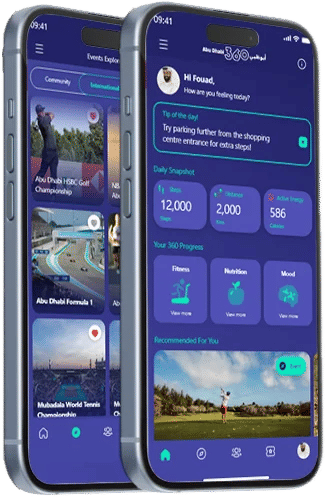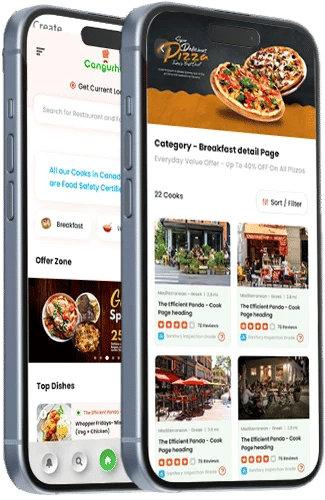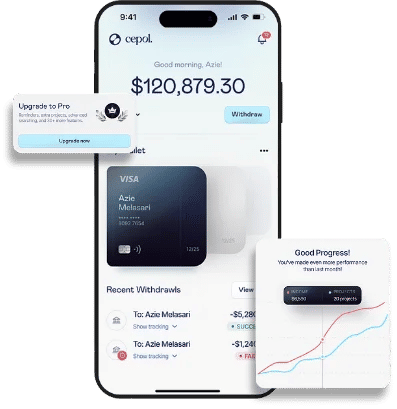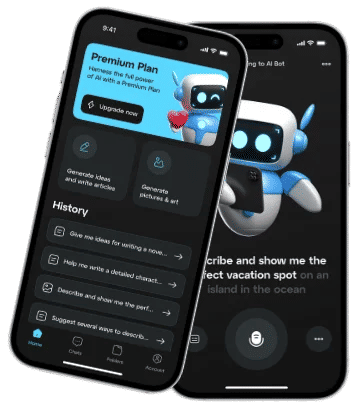Why is Mobile App Development Important?
There are more smartphone users than desktop/laptop users. Mobile applications pave the path for businesses to grow and reach a wider audience. Custom mobile app development is crucial to make your business future-proof. Let’s glance through some statistics that justify these statements:
- The number of app users is projected to be 7.49 billion by 2025.
- The global mobile app market is expected to grow at a CAGR of 13.8% between 2023 to 2030.
- Businesses are increasingly investing in consumer applications. The investment is expected to exceed $270 billion by 2025.
How to Develop a Mobile App?
Custom mobile app development requires expert mobile app developers to follow step-by-step processes. These processes are as follows:
Refine The App development Idea And Strategize
The first step is to refine the app development idea, defining the project scope, objectives, and goals. It also involves strategizing the resources required for app development, timelines for each process, and more.
Market Research
Market research involves considering the current and future market trends and understanding customers’ needs and behavior to develop an app that meets customers’ expectations.
Requirement Analysis
This step includes gathering and documenting detailed app requirements. Analyzing, prioritizing, and validating these requirements to ensure they are feasible and realistic.
Selection of Mobile App Development Platform
Selecting the right mobile app development platform is essential. This step involves considering various parameters, such as the budget, target audience, etc., to determine which platform for a particular type of mobile application.
Create Mobile App Prototype and Wireframe
An app’s wireframing involves deciding the information on the page, preparing an outline or structure of the page, and conveying the overall description of the user interface. On the other hand, a prototype is a working model of the app; it describes how a real app will look.
Build UI/UX Design
The next step is to create an appealing UI/UX design with stunning graphics. The main aim of designers is to create a design that reflects a brand’s identity and delivers immersive and engaging user experiences.
Development
App development involves writing codes using the right tech infrastructure, such as frameworks, programming languages, and tools.
Mobile App Testing
After designing and developing the app, the next step is to test all components and processes for their smooth functioning. Testing also ensures the app has no bugs or errors.
Launch Mobile App
Handing the developed project to the client and launching it on Android, iOS, or Windows platforms comes under this step.
Mobile App Support and Maintenance
Continuous support and maintenance are essential to ensure that the users never face any difficulty or technical glitches with the app.
6 Factors to Consider When Hiring A Mobile App Development Company
-
Technical Expertise and Experience
The company you choose for mobile app development should have enough experience in technologies like AI, AR, VR, ML, Blockchain, IoT, and more. Its development team should also be conversant with frameworks like React Native, Flutter, etc., and programming languages like Java, Kotlin, Swift, Objective-C, etc. They should know which tech infrastructure would be the right fit for an Android, Windows, or iOS app platform.
-
Portfolio and Client Reviews
The company should have a strong portfolio, including app development for diverse industries, including healthcare, sports, gaming, travel, medical, and more. To ensure this, explore their case studies and portfolio section. Apart from this, check their clients’ reviews to understand the type of projects they have delivered and the quality of their work.
-
Communication and Project Management
Effective communication and project management are crucial for successful app development. Make sure the company has clear communication channels and offers regular updates on the project’s progress.
-
App Support and Maintenance
Check if the company provides support and maintenance services after deploying and launching the app. Both these services are critical to fixing bugs and technical issues that may arise later. It is also essential if you want to add new features to the app in the future.
-
Flexibility
An app’s requirements or objectives may evolve during the app development cycle. Therefore, look for a company that offers flexibility.
-
Scalability
Check whether the company provides scalable mobile app development services or not. Scalability ensures the company is open to adding or removing features as your business scales or grows.
8 Causes of Mobile App Failure and Their Solution
-
Bugs and Technical Glitches
Bugs or technical glitches directly affect the app’s functionality and its features’ accessibility. It also impacts the customer experience.
The best solution to this problem is regular testing during the app’s development. Apart from this, after-launch support and maintenance by the mobile app development company can keep errors and technical issues at bay.
-
Poor User Experience (UX)
If the app interface is vague, difficult to navigate, or doesn’t support responsiveness, it may lead to poor user experience and, hence, app failure.
Conducting thorough user testing and feedback sessions and prioritizing user-centric design and simple navigation can resolve this problem. Besides, regularly update the app based on user feedback.
-
Performance Issues
Performance-related problems arise when the app works slowly, crashes frequently, or consumes excessive resources.
Optimizing the app’s code and database queries can help overcome this issue. Using a caching mechanism can also help resolve this problem by shrinking the data retrieval time. Another solution is to test the app on different devices and operating systems to identify and resolve performance-related difficulties.
-
Compatibility Problems
Compatibility issues occur when the app works well on some devices while malfunctions on others.
Thoroughly test the app on all targeted devices and operating systems. Moreover, use responsive design principles to ensure the app works well on different screen sizes and resolutions.
-
Security Issues
An app captures and stores sensitive user data, including payment information, personal details, etc., to allow users to use its products/services. Any security issue can make the app susceptible to cyber-attacks and data breaches.
Implementing secure coding practices and regularly updating the app with security patches can help overcome this problem. Furthermore, mobile app development companies should use encryption technology for sensitive data.
-
Poor App Store Optimization
Improper optimization of an app on the app store leads to its failure.
Pay attention while designing the app’s title, description, and keywords. It will help improve the app’s discoverability or visibility. Implementing appealing visuals and screenshots to highlight the app’s features would also work in your favor.
-
Not Working on User Feedback
Not addressing users’ feedback is one of the prime reasons for an app’s failure.
To solve this problem, keep a tab on users’ feedback and resolve them instantly. Connect them via different social media channels to collect feedback and foster a healthy relationship with them.
-
Improper Monetization Strategy
Any app fails to generate revenue if the monetization strategy is not good or doesn’t have a clear value proposition for users.
Carefully plan the app’s monetization strategy and ensure it aligns with a brand’s goals and target audience. Different monetization options include in-app purchases, subscription-based models, and in-app advertisements.
Why Should You Need to Develop a Mobile App?
To Expand Your Reach
The number of smartphone users is more than laptop/desktop users. It is even more than mobile website users. So, having a mobile app with the right marketing strategy allows you to expand your business reach, increase your customer base, improve customer experience, and open new revenue streams.
To Enhance Customer Engagement
Modern customers expect instant access to products and services, and with a mobile app, you can meet these expectations. A mobile app enables users to access products/services within seconds. Furthermore, you can use push notifications to improve customer engagement and bring them back to the app.
To Increase Revenue
The ultimate goal of any business is to improve customer experience and generate as much revenue as possible. A mobile app opens many revenue streams with in-app advertisements, push notifications, subscription-based models, and more. It helps your business to grow and scale.
To Deliver a Personalized Experience
Mobile applications powered by the capabilities of AI, ML, IoT, and other technologies enable you to understand customers’ behaviors, purchase patterns, and more. Based on these insights, you can deliver personalized content and recommendations, which enhances the customer experience.
What Types of Businesses Need a Mobile App?
Mobile applications contribute to targeting a wider audience, increasing revenue, and improving customer experience. It means all types of businesses, including healthcare, education, finance, gaming, sports, travel, hospitality, and eCommerce, need a mobile app to meet customers’ needs and boost profitability.



































































